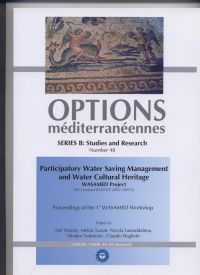| Article précédent | p. 49-55 | Article suivant |
Integrated approach for water and water management
The basic objective of irrigation projects is to raise the economical and social welfare of farmers to the possible highest level. To meet this objective, it is necessary to establish a proper operation-maintenance and management organization and also to establish an effective input supply and marketing system along with an effective training and broadcasting. Environmental factors were stressed out in Turkey especially after 1980s. Water quality spoiled out due to fast urbanization and industrialization and available water resources decreased. Water quality spoils along the river basin are principally based on the factors such as industrial and domestic waste water utilization in agriculture, types of land utilization, soil properties, sediment transport and erosion. Development of economical potential of above and under ground water resources with a sustainable approach along with the consideration of environmental effects has a significant importance to maintain sustainability in socio-economical development. A sustainable water resource development will only be possible by a proper institutional mechanism, participated management, and full payment of the cost of all the water related services by the beneficiaries, sustainability of research and development activities and selection of proper technology.
- [ Afficher ]
- [ Télécharger ]
- [ Exporter la citation ]
Vous pouvez télécharger la citation au format :
- [ Imprimer ]
-
Mots-clés
DURABILITE, FACTEUR DU MILIEU, GESTION DE PROJET, GESTION DES EAUX, IRRIGATION, RESSOURCE EN EAU, TURQUIECiter cet article
Yildirim Y.E. Integrated approach for water and water management. In : Hamdy A. (ed.), Tüzün M. (ed.), Lamaddalena N. (ed.), Todorovic M. (ed.), Bogliotti C. (ed.). Participatory water saving management and water cultural heritage. Bari : CIHEAM, 2004. p. 49-55. (Options Méditerranéennes : Série B. Etudes et Recherches; n. 48). 1. WASAMED (Water Saving in Mediterranean Agriculture) Workshop, 2003/12/15-19, Sanliurfa (Turkey). http://om.ciheam.org/om/pdf/b48/05002281.pdf



